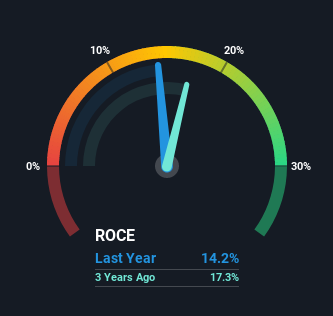There are a few key trends to look for if we want to identify the next multi-bagger. Amongst other things, we'll want to see two things; firstly, a growing return on capital employed (ROCE) and secondly, an expansion in the company's amount of capital employed. This shows us that it's a compounding machine, able to continually reinvest its earnings back into the business and generate higher returns. So, when we ran our eye over Kaap Agri's (JSE:KAL) trend of ROCE, we liked what we saw.
Return On Capital Employed (ROCE): What is it?
Just to clarify if you're unsure, ROCE is a metric for evaluating how much pre-tax income (in percentage terms) a company earns on the capital invested in its business. Analysts use this formula to calculate it for Kaap Agri:
Return on Capital Employed = Earnings Before Interest and Tax (EBIT) ÷ (Total Assets - Current Liabilities)
0.14 = R456m ÷ (R5.8b - R2.6b) (Based on the trailing twelve months to September 2021).
Thus, Kaap Agri has an ROCE of 14%. In absolute terms, that's a pretty normal return, and it's somewhat close to the Consumer Retailing industry average of 17%.
View our latest analysis for Kaap Agri

While the past is not representative of the future, it can be helpful to know how a company has performed historically, which is why we have this chart above. If you'd like to look at how Kaap Agri has performed in the past in other metrics, you can view this free graph of past earnings, revenue and cash flow.
So How Is Kaap Agri's ROCE Trending?
While the returns on capital are good, they haven't moved much. The company has consistently earned 14% for the last five years, and the capital employed within the business has risen 124% in that time. Since 14% is a moderate ROCE though, it's good to see a business can continue to reinvest at these decent rates of return. Stable returns in this ballpark can be unexciting, but if they can be maintained over the long run, they often provide nice rewards to shareholders.
On a side note, Kaap Agri's current liabilities are still rather high at 45% of total assets. This effectively means that suppliers (or short-term creditors) are funding a large portion of the business, so just be aware that this can introduce some elements of risk. Ideally we'd like to see this reduce as that would mean fewer obligations bearing risks.
The Bottom Line
The main thing to remember is that Kaap Agri has proven its ability to continually reinvest at respectable rates of return. And since the stock has risen strongly over the last three years, it appears the market might expect this trend to continue. So even though the stock might be more "expensive" than it was before, we think the strong fundamentals warrant this stock for further research.
Like most companies, Kaap Agri does come with some risks, and we've found 1 warning sign that you should be aware of.
If you want to search for solid companies with great earnings, check out this free list of companies with good balance sheets and impressive returns on equity.
Valuation is complex, but we're here to simplify it.
Discover if KAL Group might be undervalued or overvalued with our detailed analysis, featuring fair value estimates, potential risks, dividends, insider trades, and its financial condition.
Access Free AnalysisHave feedback on this article? Concerned about the content? Get in touch with us directly. Alternatively, email editorial-team (at) simplywallst.com.
This article by Simply Wall St is general in nature. We provide commentary based on historical data and analyst forecasts only using an unbiased methodology and our articles are not intended to be financial advice. It does not constitute a recommendation to buy or sell any stock, and does not take account of your objectives, or your financial situation. We aim to bring you long-term focused analysis driven by fundamental data. Note that our analysis may not factor in the latest price-sensitive company announcements or qualitative material. Simply Wall St has no position in any stocks mentioned.
About JSE:KAL
KAL Group
Operates as a diversified trader and retailer in the agricultural, manufacturing, retail, and fuel and convenience markets in South Africa and Namibia.
Excellent balance sheet second-rate dividend payer.
Market Insights
Community Narratives



